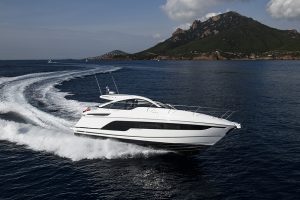IC 45 Winter Series
Day One – Adrian Stead and his team aboard Barlo Plastics, began their Admiral’s Cup campaign in style with emphatic wins in both the opening races of the Clean Marine Winter series regatta in Palma, Mallorca. Olympic Silver medallist, Ian Walker stepped in as guest helmsman in place of Olympic Gold medallist, Ben Ainslie who has America’s Cup commitments elsewhere.
Barlo Plastics came took the lead at the start in both races, and with superior boat handling and good speed, never once fell behind. With Stead in command of an all-star crew and Walker at the helm, Downwind, surfing in big swells, Stead called a series of gybes which were perfectly executed by Walker and the crew to pull out a few more lengths by the bottom mark.
The strategy for race two was similar, though different in one vital respect. With the wind now more settled, Stead elected to call an early tack to the right on the first beat. Conscious of the gains made on the left in the previous race, most of the fleet continued on starboard tack but once again it was Barlo Plastic making the right decisions. ‘We were about five boat lengths ahead at the first cross,’ said Stead, ‘and we never looked back from there.’
Day Two – Another solid Performance for Barlo Plastics on day two of the Clean Marine Winter Series saw the British Admiral’s Cup team boat consolidating her lead at the front of the fleet. After a two-hour delay to allow a howling gale subside the fleet of seven IC 45’s finally started after lunch.
Though the wind was by now down to just 20 knots, the predominantly north westerly direction was far from stable with huge shifts rolling down from the city of Palma and the mountains behind. Just to make life even more difficult, a long swell was still running in from the south. With more strong conditions forecast, Barlo Plastics elected to keep her race mainsail as fresh as possible and sail with her spare sail.
A rare mistake from skipper and tactician Adrian Stead saw Barlo Plastics on the wrong side of the course out of the start. While ‘Investor’ sailed off into a left-hand shift and a huge lead, Stead directed Barlo Plastics up the right side of the course. The price to be paid was last place rounding of the windward mark. Showing good boat handling, excellent speed and a better awareness of the shifts, Stead called the shots to put Barlo Plastics ahead of ‘Aifos’ and ‘Baballas’ by the bottom mark. Two more legs of the course saw further excellent progress, with all but the now long-gone ‘Investor’ slowly hauled in by the finish.
By race two the breeze had dropped yet more, though the shifts were if anything even more unpredictable. One mistake in a day is generally more than enough for Stead and this time he called the start and first beat to perfection. ‘We came out at the pin with good speed,’ said helmsman, double Olympic medallist Ian Walker, ‘When we tacked we crossed the fleet by half a boat length and could control the race from there.’
With their boat speed confirmed by the previous race’s performance, Barlo Plactics sailed a conservative race from here on, shepherding the fleet behind her. Demonstration, if any were needed, as to just how expensive simple mistakes can be in this highly competitive fleet came from ‘Investor’ who with just one slip on the run managed to split their mainsail. Surprisingly, the race committee gave them enough time to sail back to the dock to replace the sail before attempting to start a third race. With the wind becoming ever more unpredictable, this proved to be their undoing and by the time the third race was underway, the windward leg had turned to a reach and the race was abandoned at the leeward mark – with Barlo Plastics in the lead. An attempt at another start proved more successful though this time the windward mark was nowhere to be found.
With four races now sailed and only two more likely on the final day, Barlo Plastics held a virtually unassailable lead wi








